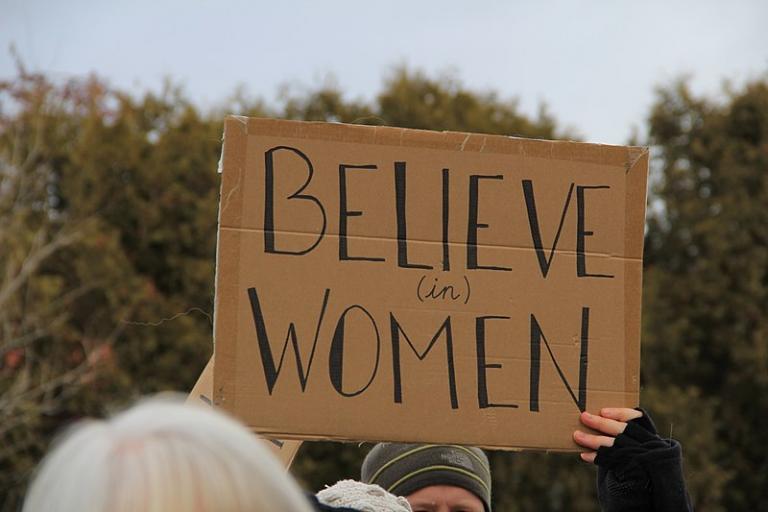It doesn’t mean what the opponents of #MeToo think it means – or pretend to think it means.
In ordinary discourse, if a person tells you “my vehicle was stolen,” or “I was the victim of fraud,” we listen, and strive to respond with consideration and respect. Unless the person is known to be mendacious or delusional, our expressions of sympathy and shared distress are sincere. We have no reason to believe this person is lying to us. We owe it to them at least to suspend judgment about whether or not they are telling the truth, long enough to hear them out. And we can believe them in a casual, practical sense without claiming absolute epistemological certainty that they aren’t lying: this is just courtesy.
What if they tell us that the perpetrator of the injustice is someone we admire, or don’t want to believe bad things about? Well, “suspending judgment” in this case may incline towards the pole of doubt. But still, we listen. We want their injustice resolved, the case looked into.
This is just normal human functioning.
When it comes to assault accusations, however, all this disappears. Authority figures refuse to believe. Friends say “you must be exaggerating.” Behind the victim’s back, people murmur that she must have done something to encourage it. It’s obviously her fault as much as his…if he was really even involved…but maybe he wasn’t…yeah, probably he wasn’t….couldn’t have been….she must be delusional….she must be lying…she’s probably crazy….a vindictive bitch….some political motive.
Anything, other than believe her, even a bit. Anything, so long as it doesn’t involve listening to her with the courtesy and consideration a human being deserves, especially one who is vulnerable, possibly traumatized, and afraid of disclosing such intimate and painful material.
Disbelief of assault accusations is in extreme disproportion to the rate at which assault actually occurs.
Incidents of false accusation are very rare, whereas incidents of assault are horribly common. On the basis of these statistics, it makes no sense to assume a woman is lying, unless she is a known liar. We know too much about how it works, by now. No longer can we pretend that “good men” don’t commit assault, or that someone close to us couldn’t be a secret predator. We know that abusers groom those around them to view them as trustworthy or even sacrosanct. This being the case, all accusations should be taken seriously, not brushed off as female hysteria, deception, or manipulation.
This is what we mean by “believe women.” It doesn’t mean some wildly uncritical acceptance without questioning. It means giving women who speak out about assault and harassment exactly the same consideration you would give to a man speaking out about his injustice.
It doesn’t mean special treatment: it means normal treatment.
Take women seriously. Follow up on accusations. Don’t shut down investigations before they’re conclusive. Don’t tell women it’s no big deal, not worth reporting. Don’t shame women who report, or intimidate them into silence. Give them the exact same consideration you would give anyone speaking of their experience of victimization.
In the rare cases when false accusations happen, following through on claims is the best way to make sure an innocent person is cleared of suspicion.
But our culture, and every culture before us, has disvalued women’s voices and women’s bodies. This is why we had to fight so hard for the right to vote – still denied us in a few areas – and why we were traded off between men for breeding purposes. And not only individuals, but every level of civilization, was complicit in the dehumanization of women. This may be why we can’t bear to hear about assault cases: because in a broader sense, we too are guilty of furthering misogyny and a culture of objectification. And how many men don’t want to believe a woman who says “this was done to me, and it was terrible” – because they have done the same kind of thing, themselves? Judging from the statistics, many. Many assaults go unreported. Many real assaults get written off as “false accusations,” because the man’s word is dominant.
We’re not privileging women’s voices. We’re simply asking for equal consideration with those who already enjoy the privilege of being believed, of taking center stage in every story.
But when you’re used to power, equality feels like injustice.
image credit: commons.wikimedia.org/wiki/File:2018_Women%27s_March_in_Missoula,_Montana_98.jpg












